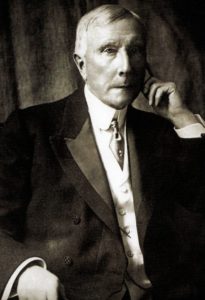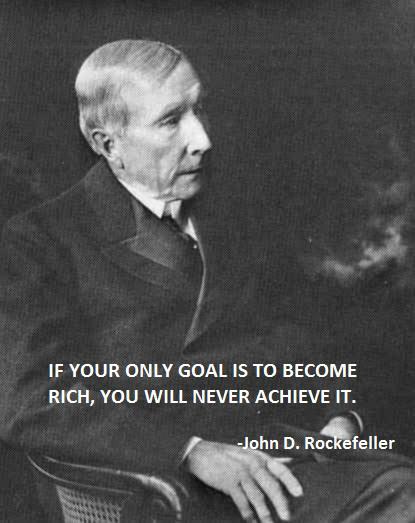A couple days ago, I posted about Booker T. Washington—the fruit of the preparation I’m doing for a course called “The Emergence of Modern America, 1877-1917.” I hope I showed in that post that he is someone to be admired for his character.
 Another figure from that time period who needs his reputation reexamined is John D. Rockefeller. Historians typically castigate this man for supposedly destroying other companies by buying them out. Another presumably evil thing he did was to negotiate with the railroads for special rates for shipping his product: Standard oil.
Another figure from that time period who needs his reputation reexamined is John D. Rockefeller. Historians typically castigate this man for supposedly destroying other companies by buying them out. Another presumably evil thing he did was to negotiate with the railroads for special rates for shipping his product: Standard oil.
I won’t try to do a total overhaul of those interpretations today, but I will offer these rejoinders:
First, Rockefeller was a very efficient oil producer; many other companies were sloppily run and doomed to failure. Many people that he bought out were actually saved by the transaction. He paid them a good market price for their equipment and sometimes even hired the best of their managers and employees.
He’s accused of creating a monopoly, which would be bad for consumers because monopolies can charge whatever they wish. Well, Rockefeller so lowered the price of oil to all Americans that they all could afford it, thereby lighting their homes in a significantly cheaper way than by candles.
What about the special rates with the railroads? Unfair? If someone gives you far more business than another person, what’s morally wrong with providing them, in return, a better rate? Isn’t that how business operates all the time? Buy in quantity and you get a lower price. Ever heard of Sam’s Club?
Rockefeller, to the surprise of many, was a devoted Baptist who tithed from his millions to his church and to missionary endeavors. And when journalists hoped to find an extravagant lifestyle that they could expose, they ran into the proverbial brick wall. Rockefeller liked nothing more than quiet times at home and going to church with his family.
Everyone talks about how much money Andrew Carnegie gave away. That’s fine, but Rockefeller gave away even more, and he was more focused on Christian charities. He even gave the funds necessary to ensure the establishment of Spelman College, the historically black women’s college that is named after his wife’s family.
I found some very fascinating Rockefeller quotes in my research. Here’s one that shows his goal for becoming rich:
He noted that anyone who concentrates solely on getting rich is missing the mark:
And how about this one from arguably the richest man in America at that time?
Although a Baptist, Rockefeller saw all Christians as his brothers and sisters:
And I’ll end with this:
So did Rockefeller never make a misstep? Am I whitewashing him because of my personal agenda? There are some things to critique, but I think they are minor in comparison with what he accomplished. He deserves more credit than many historians are willing to acknowledge.





